Addressing Challenges of Novice ELT Teachers Through Mentoring
VerifiedAdded on 2023/05/28
|25
|3637
|169
Report
AI Summary
This report examines the challenges faced by novice English language teachers (ELT) in primary schools in Nepal, particularly concerning traditional teaching methods and lack of student motivation. The study investigates how mentoring practices can help these teachers overcome these challenges and enhance their professional development. Through interviews with 15 English language teachers, the report highlights the importance of mentoring in navigating traditional norms, fostering student engagement, and integrating new teaching strategies. It also relates social capital, network theory, and learning organization theory to address the problems. The findings underscore the significance of supportive mentorship in empowering novice teachers and improving English language education in primary schools.
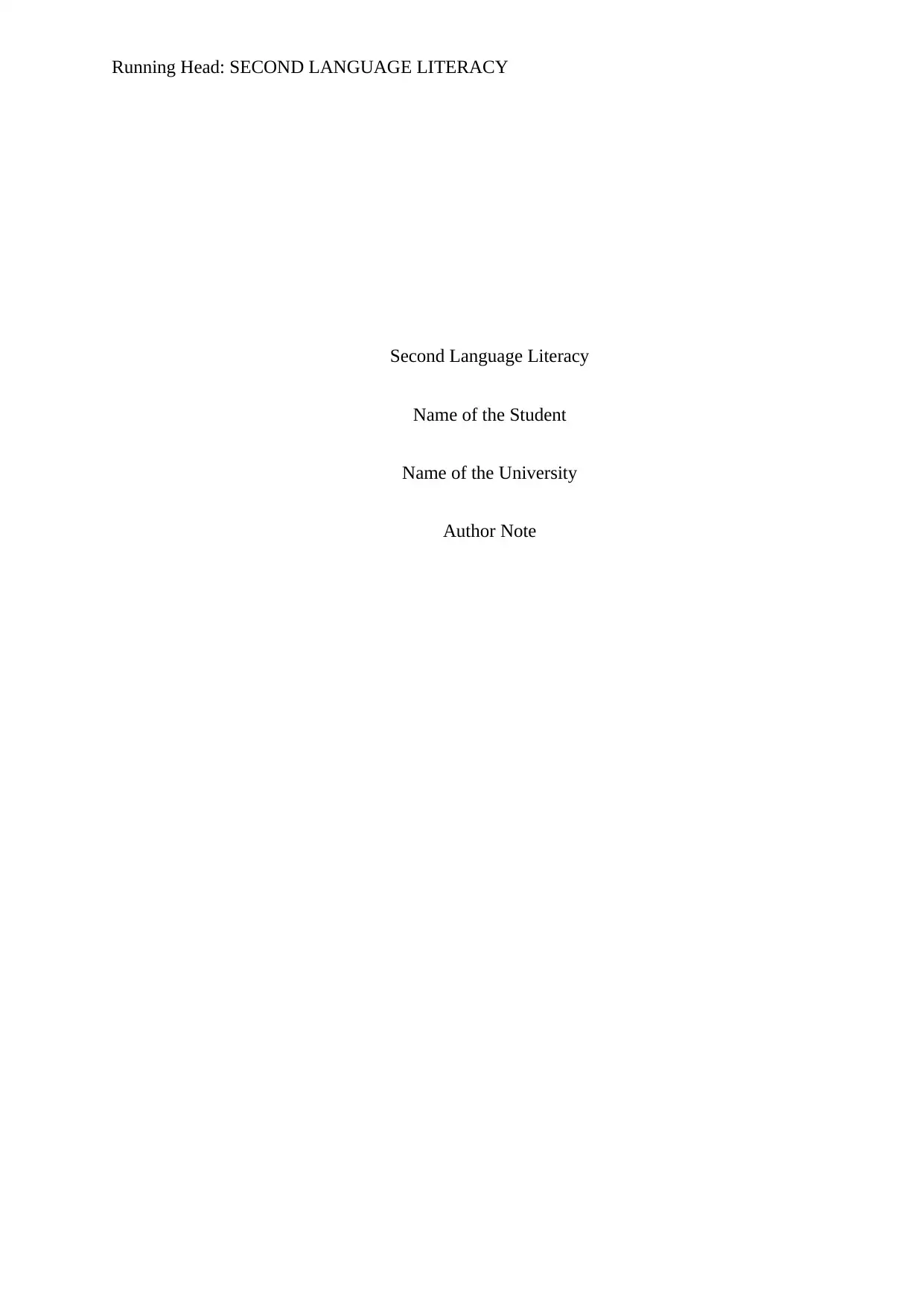
Running Head: SECOND LANGUAGE LITERACY
Second Language Literacy
Name of the Student
Name of the University
Author Note
Second Language Literacy
Name of the Student
Name of the University
Author Note
Paraphrase This Document
Need a fresh take? Get an instant paraphrase of this document with our AI Paraphraser
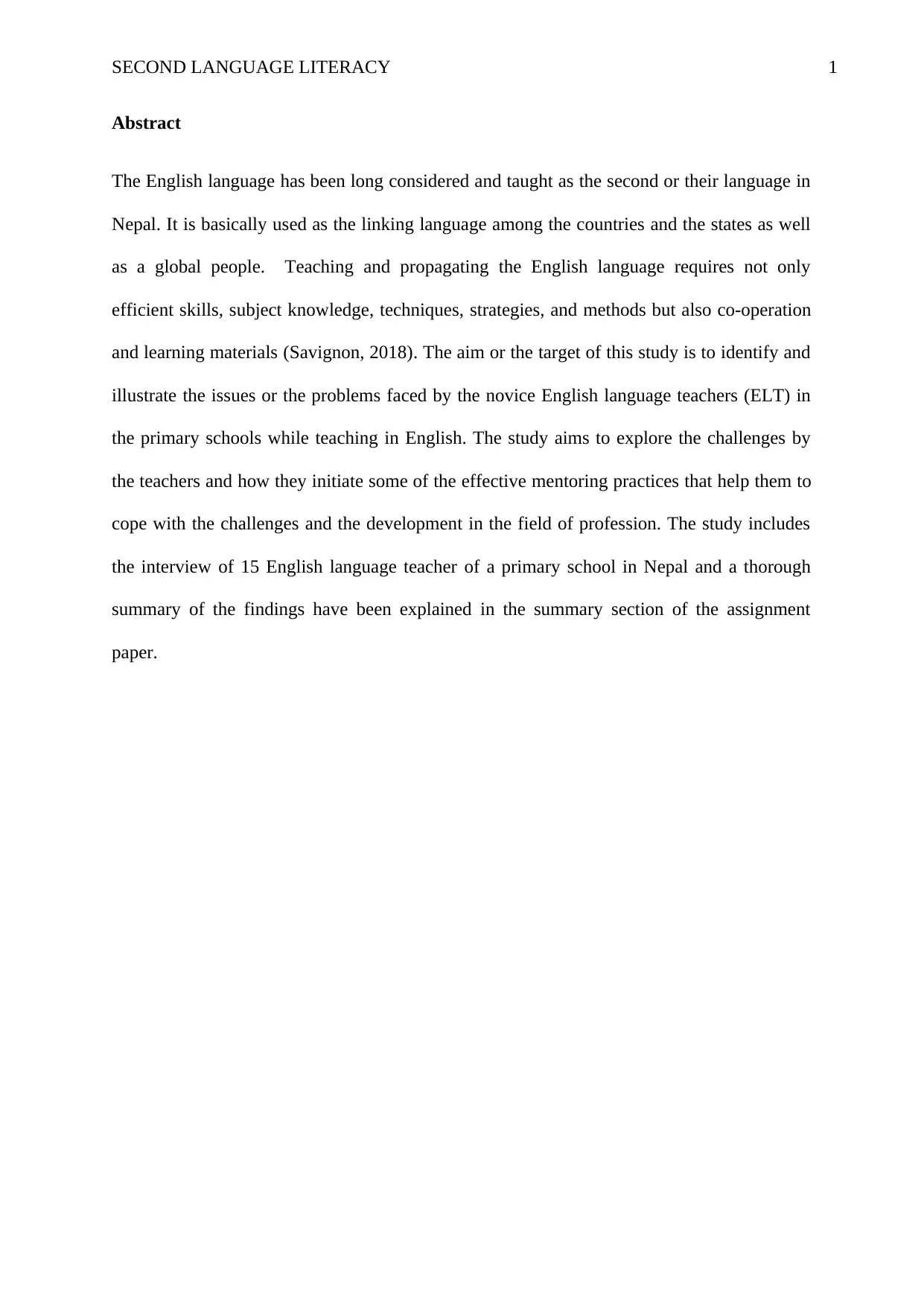
SECOND LANGUAGE LITERACY 1
Abstract
The English language has been long considered and taught as the second or their language in
Nepal. It is basically used as the linking language among the countries and the states as well
as a global people. Teaching and propagating the English language requires not only
efficient skills, subject knowledge, techniques, strategies, and methods but also co-operation
and learning materials (Savignon, 2018). The aim or the target of this study is to identify and
illustrate the issues or the problems faced by the novice English language teachers (ELT) in
the primary schools while teaching in English. The study aims to explore the challenges by
the teachers and how they initiate some of the effective mentoring practices that help them to
cope with the challenges and the development in the field of profession. The study includes
the interview of 15 English language teacher of a primary school in Nepal and a thorough
summary of the findings have been explained in the summary section of the assignment
paper.
Abstract
The English language has been long considered and taught as the second or their language in
Nepal. It is basically used as the linking language among the countries and the states as well
as a global people. Teaching and propagating the English language requires not only
efficient skills, subject knowledge, techniques, strategies, and methods but also co-operation
and learning materials (Savignon, 2018). The aim or the target of this study is to identify and
illustrate the issues or the problems faced by the novice English language teachers (ELT) in
the primary schools while teaching in English. The study aims to explore the challenges by
the teachers and how they initiate some of the effective mentoring practices that help them to
cope with the challenges and the development in the field of profession. The study includes
the interview of 15 English language teacher of a primary school in Nepal and a thorough
summary of the findings have been explained in the summary section of the assignment
paper.
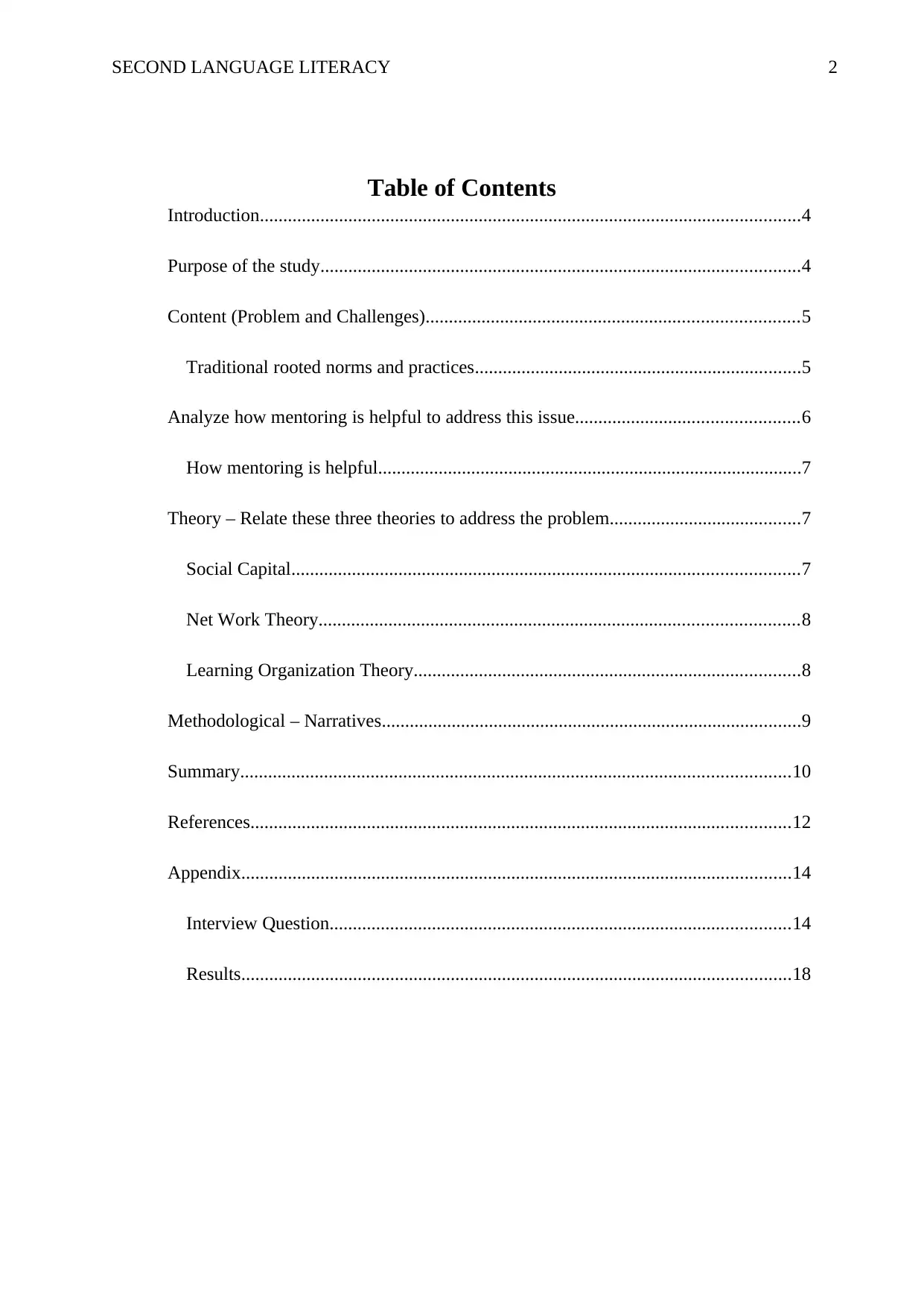
SECOND LANGUAGE LITERACY 2
Table of Contents
Introduction....................................................................................................................4
Purpose of the study.......................................................................................................4
Content (Problem and Challenges)................................................................................5
Traditional rooted norms and practices......................................................................5
Analyze how mentoring is helpful to address this issue................................................6
How mentoring is helpful...........................................................................................7
Theory – Relate these three theories to address the problem.........................................7
Social Capital.............................................................................................................7
Net Work Theory.......................................................................................................8
Learning Organization Theory...................................................................................8
Methodological – Narratives..........................................................................................9
Summary......................................................................................................................10
References....................................................................................................................12
Appendix......................................................................................................................14
Interview Question...................................................................................................14
Results......................................................................................................................18
Table of Contents
Introduction....................................................................................................................4
Purpose of the study.......................................................................................................4
Content (Problem and Challenges)................................................................................5
Traditional rooted norms and practices......................................................................5
Analyze how mentoring is helpful to address this issue................................................6
How mentoring is helpful...........................................................................................7
Theory – Relate these three theories to address the problem.........................................7
Social Capital.............................................................................................................7
Net Work Theory.......................................................................................................8
Learning Organization Theory...................................................................................8
Methodological – Narratives..........................................................................................9
Summary......................................................................................................................10
References....................................................................................................................12
Appendix......................................................................................................................14
Interview Question...................................................................................................14
Results......................................................................................................................18
⊘ This is a preview!⊘
Do you want full access?
Subscribe today to unlock all pages.

Trusted by 1+ million students worldwide

SECOND LANGUAGE LITERACY 3
Paraphrase This Document
Need a fresh take? Get an instant paraphrase of this document with our AI Paraphraser
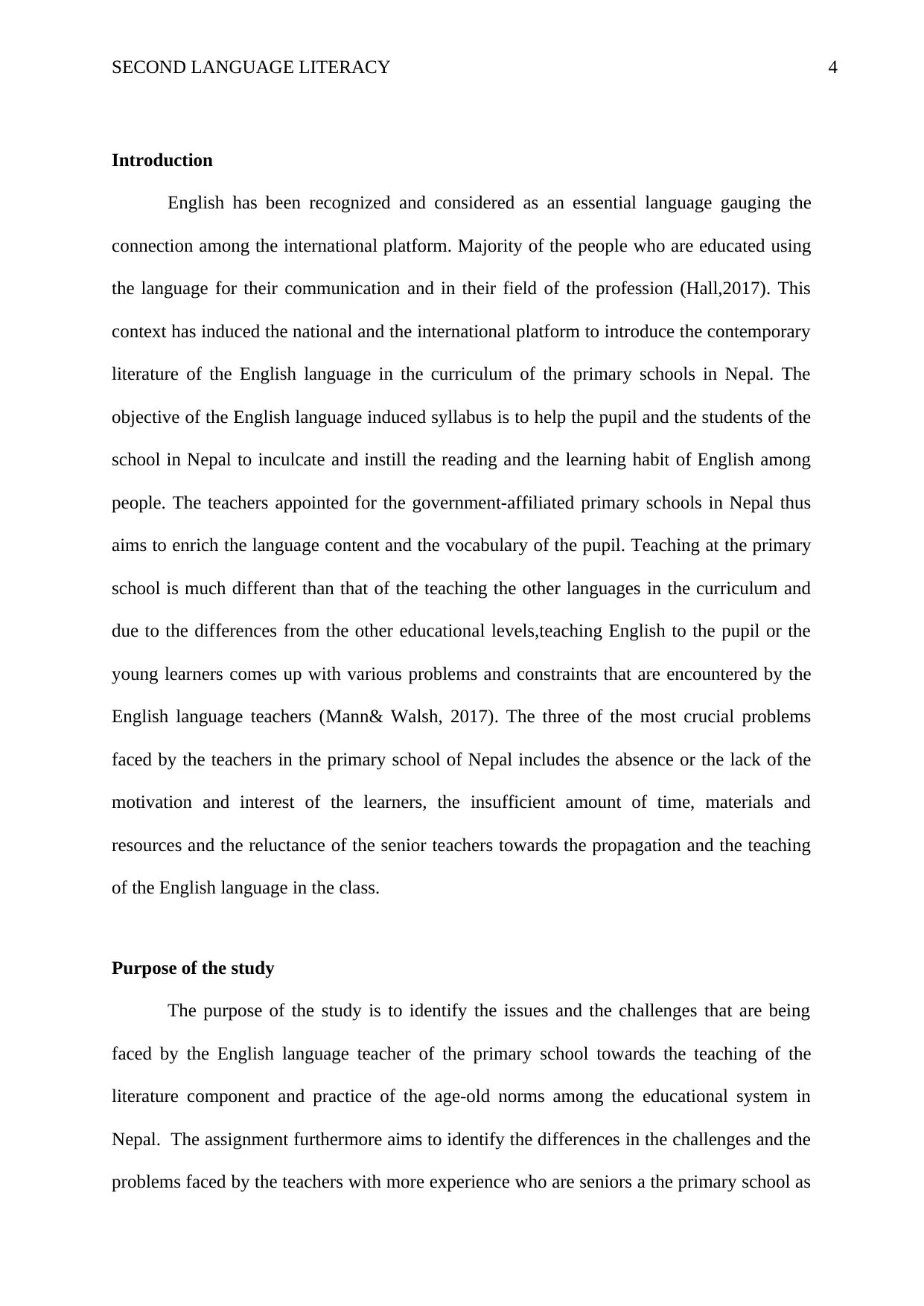
SECOND LANGUAGE LITERACY 4
Introduction
English has been recognized and considered as an essential language gauging the
connection among the international platform. Majority of the people who are educated using
the language for their communication and in their field of the profession (Hall,2017). This
context has induced the national and the international platform to introduce the contemporary
literature of the English language in the curriculum of the primary schools in Nepal. The
objective of the English language induced syllabus is to help the pupil and the students of the
school in Nepal to inculcate and instill the reading and the learning habit of English among
people. The teachers appointed for the government-affiliated primary schools in Nepal thus
aims to enrich the language content and the vocabulary of the pupil. Teaching at the primary
school is much different than that of the teaching the other languages in the curriculum and
due to the differences from the other educational levels,teaching English to the pupil or the
young learners comes up with various problems and constraints that are encountered by the
English language teachers (Mann& Walsh, 2017). The three of the most crucial problems
faced by the teachers in the primary school of Nepal includes the absence or the lack of the
motivation and interest of the learners, the insufficient amount of time, materials and
resources and the reluctance of the senior teachers towards the propagation and the teaching
of the English language in the class.
Purpose of the study
The purpose of the study is to identify the issues and the challenges that are being
faced by the English language teacher of the primary school towards the teaching of the
literature component and practice of the age-old norms among the educational system in
Nepal. The assignment furthermore aims to identify the differences in the challenges and the
problems faced by the teachers with more experience who are seniors a the primary school as
Introduction
English has been recognized and considered as an essential language gauging the
connection among the international platform. Majority of the people who are educated using
the language for their communication and in their field of the profession (Hall,2017). This
context has induced the national and the international platform to introduce the contemporary
literature of the English language in the curriculum of the primary schools in Nepal. The
objective of the English language induced syllabus is to help the pupil and the students of the
school in Nepal to inculcate and instill the reading and the learning habit of English among
people. The teachers appointed for the government-affiliated primary schools in Nepal thus
aims to enrich the language content and the vocabulary of the pupil. Teaching at the primary
school is much different than that of the teaching the other languages in the curriculum and
due to the differences from the other educational levels,teaching English to the pupil or the
young learners comes up with various problems and constraints that are encountered by the
English language teachers (Mann& Walsh, 2017). The three of the most crucial problems
faced by the teachers in the primary school of Nepal includes the absence or the lack of the
motivation and interest of the learners, the insufficient amount of time, materials and
resources and the reluctance of the senior teachers towards the propagation and the teaching
of the English language in the class.
Purpose of the study
The purpose of the study is to identify the issues and the challenges that are being
faced by the English language teacher of the primary school towards the teaching of the
literature component and practice of the age-old norms among the educational system in
Nepal. The assignment furthermore aims to identify the differences in the challenges and the
problems faced by the teachers with more experience who are seniors a the primary school as
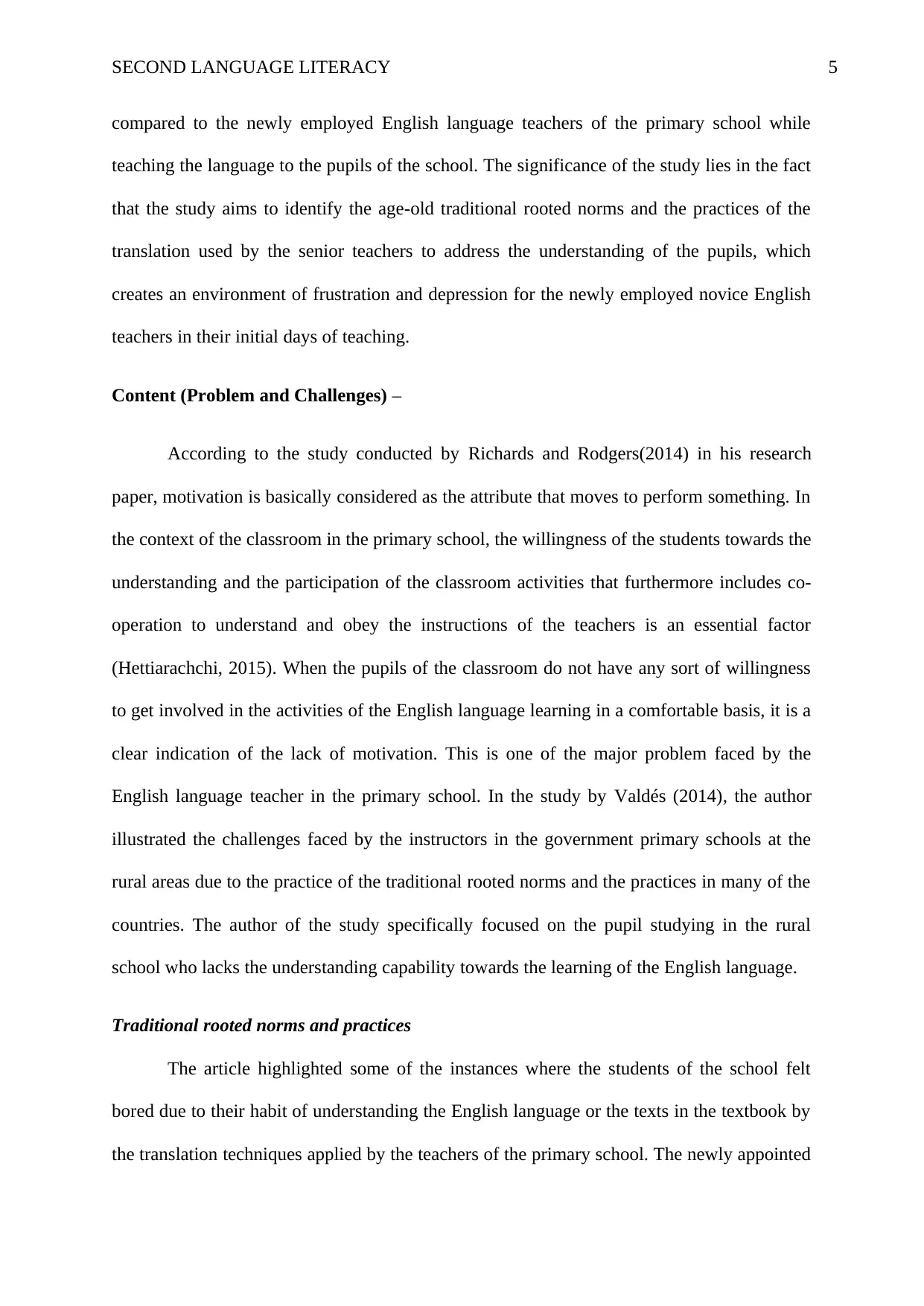
SECOND LANGUAGE LITERACY 5
compared to the newly employed English language teachers of the primary school while
teaching the language to the pupils of the school. The significance of the study lies in the fact
that the study aims to identify the age-old traditional rooted norms and the practices of the
translation used by the senior teachers to address the understanding of the pupils, which
creates an environment of frustration and depression for the newly employed novice English
teachers in their initial days of teaching.
Content (Problem and Challenges) –
According to the study conducted by Richards and Rodgers(2014) in his research
paper, motivation is basically considered as the attribute that moves to perform something. In
the context of the classroom in the primary school, the willingness of the students towards the
understanding and the participation of the classroom activities that furthermore includes co-
operation to understand and obey the instructions of the teachers is an essential factor
(Hettiarachchi, 2015). When the pupils of the classroom do not have any sort of willingness
to get involved in the activities of the English language learning in a comfortable basis, it is a
clear indication of the lack of motivation. This is one of the major problem faced by the
English language teacher in the primary school. In the study by Valdés (2014), the author
illustrated the challenges faced by the instructors in the government primary schools at the
rural areas due to the practice of the traditional rooted norms and the practices in many of the
countries. The author of the study specifically focused on the pupil studying in the rural
school who lacks the understanding capability towards the learning of the English language.
Traditional rooted norms and practices
The article highlighted some of the instances where the students of the school felt
bored due to their habit of understanding the English language or the texts in the textbook by
the translation techniques applied by the teachers of the primary school. The newly appointed
compared to the newly employed English language teachers of the primary school while
teaching the language to the pupils of the school. The significance of the study lies in the fact
that the study aims to identify the age-old traditional rooted norms and the practices of the
translation used by the senior teachers to address the understanding of the pupils, which
creates an environment of frustration and depression for the newly employed novice English
teachers in their initial days of teaching.
Content (Problem and Challenges) –
According to the study conducted by Richards and Rodgers(2014) in his research
paper, motivation is basically considered as the attribute that moves to perform something. In
the context of the classroom in the primary school, the willingness of the students towards the
understanding and the participation of the classroom activities that furthermore includes co-
operation to understand and obey the instructions of the teachers is an essential factor
(Hettiarachchi, 2015). When the pupils of the classroom do not have any sort of willingness
to get involved in the activities of the English language learning in a comfortable basis, it is a
clear indication of the lack of motivation. This is one of the major problem faced by the
English language teacher in the primary school. In the study by Valdés (2014), the author
illustrated the challenges faced by the instructors in the government primary schools at the
rural areas due to the practice of the traditional rooted norms and the practices in many of the
countries. The author of the study specifically focused on the pupil studying in the rural
school who lacks the understanding capability towards the learning of the English language.
Traditional rooted norms and practices
The article highlighted some of the instances where the students of the school felt
bored due to their habit of understanding the English language or the texts in the textbook by
the translation techniques applied by the teachers of the primary school. The newly appointed
⊘ This is a preview!⊘
Do you want full access?
Subscribe today to unlock all pages.

Trusted by 1+ million students worldwide
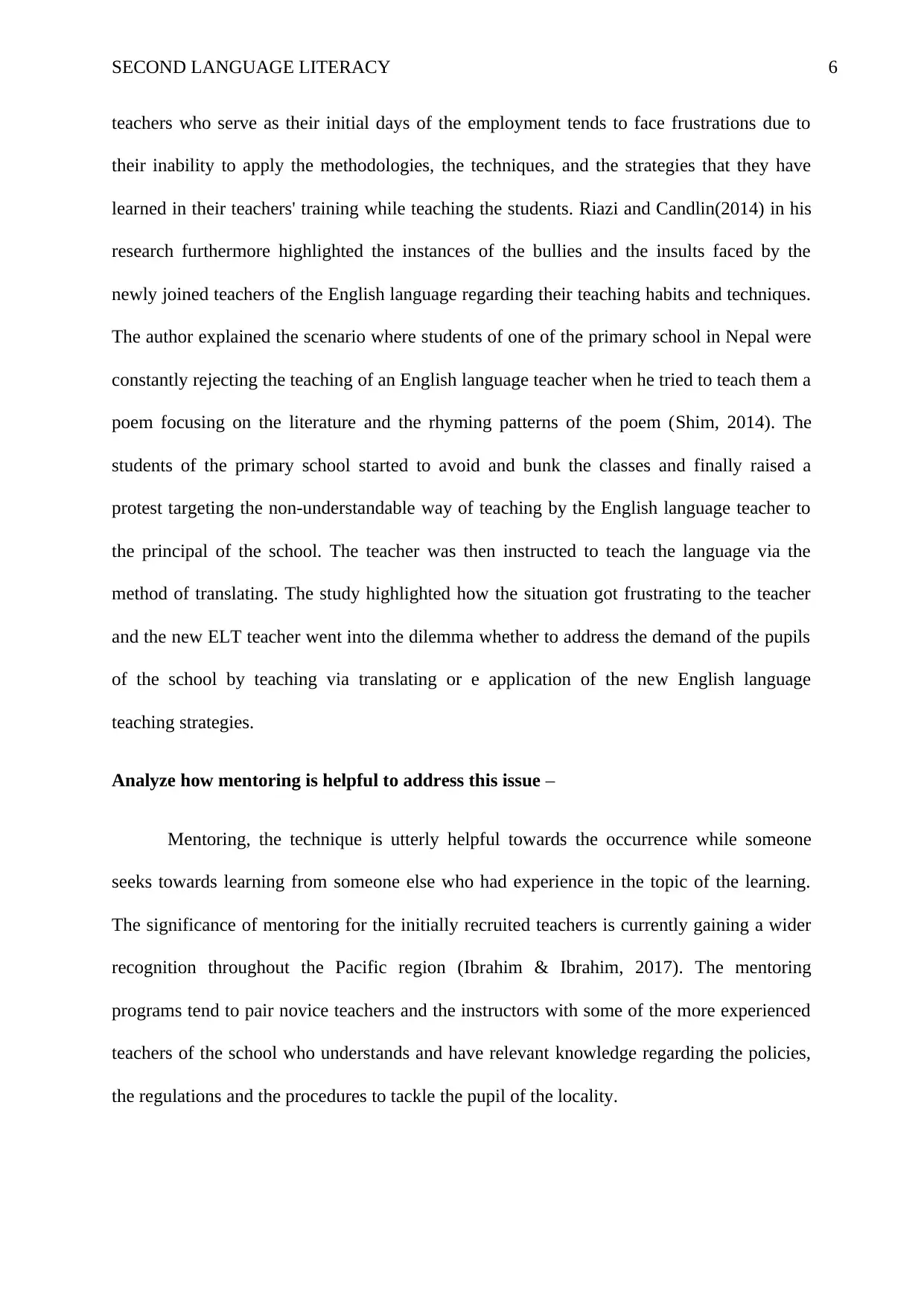
SECOND LANGUAGE LITERACY 6
teachers who serve as their initial days of the employment tends to face frustrations due to
their inability to apply the methodologies, the techniques, and the strategies that they have
learned in their teachers' training while teaching the students. Riazi and Candlin(2014) in his
research furthermore highlighted the instances of the bullies and the insults faced by the
newly joined teachers of the English language regarding their teaching habits and techniques.
The author explained the scenario where students of one of the primary school in Nepal were
constantly rejecting the teaching of an English language teacher when he tried to teach them a
poem focusing on the literature and the rhyming patterns of the poem (Shim, 2014). The
students of the primary school started to avoid and bunk the classes and finally raised a
protest targeting the non-understandable way of teaching by the English language teacher to
the principal of the school. The teacher was then instructed to teach the language via the
method of translating. The study highlighted how the situation got frustrating to the teacher
and the new ELT teacher went into the dilemma whether to address the demand of the pupils
of the school by teaching via translating or e application of the new English language
teaching strategies.
Analyze how mentoring is helpful to address this issue –
Mentoring, the technique is utterly helpful towards the occurrence while someone
seeks towards learning from someone else who had experience in the topic of the learning.
The significance of mentoring for the initially recruited teachers is currently gaining a wider
recognition throughout the Pacific region (Ibrahim & Ibrahim, 2017). The mentoring
programs tend to pair novice teachers and the instructors with some of the more experienced
teachers of the school who understands and have relevant knowledge regarding the policies,
the regulations and the procedures to tackle the pupil of the locality.
teachers who serve as their initial days of the employment tends to face frustrations due to
their inability to apply the methodologies, the techniques, and the strategies that they have
learned in their teachers' training while teaching the students. Riazi and Candlin(2014) in his
research furthermore highlighted the instances of the bullies and the insults faced by the
newly joined teachers of the English language regarding their teaching habits and techniques.
The author explained the scenario where students of one of the primary school in Nepal were
constantly rejecting the teaching of an English language teacher when he tried to teach them a
poem focusing on the literature and the rhyming patterns of the poem (Shim, 2014). The
students of the primary school started to avoid and bunk the classes and finally raised a
protest targeting the non-understandable way of teaching by the English language teacher to
the principal of the school. The teacher was then instructed to teach the language via the
method of translating. The study highlighted how the situation got frustrating to the teacher
and the new ELT teacher went into the dilemma whether to address the demand of the pupils
of the school by teaching via translating or e application of the new English language
teaching strategies.
Analyze how mentoring is helpful to address this issue –
Mentoring, the technique is utterly helpful towards the occurrence while someone
seeks towards learning from someone else who had experience in the topic of the learning.
The significance of mentoring for the initially recruited teachers is currently gaining a wider
recognition throughout the Pacific region (Ibrahim & Ibrahim, 2017). The mentoring
programs tend to pair novice teachers and the instructors with some of the more experienced
teachers of the school who understands and have relevant knowledge regarding the policies,
the regulations and the procedures to tackle the pupil of the locality.
Paraphrase This Document
Need a fresh take? Get an instant paraphrase of this document with our AI Paraphraser
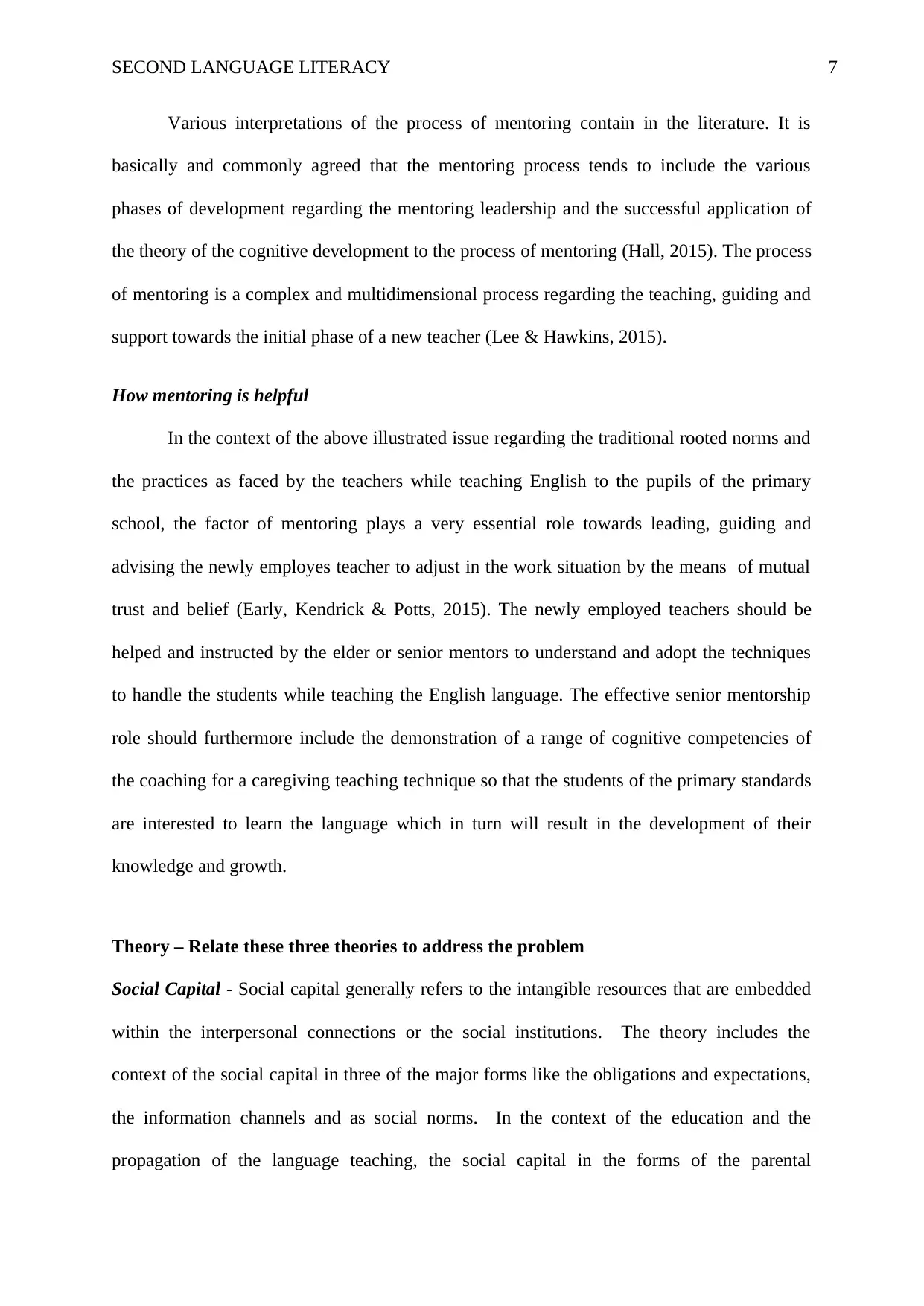
SECOND LANGUAGE LITERACY 7
Various interpretations of the process of mentoring contain in the literature. It is
basically and commonly agreed that the mentoring process tends to include the various
phases of development regarding the mentoring leadership and the successful application of
the theory of the cognitive development to the process of mentoring (Hall, 2015). The process
of mentoring is a complex and multidimensional process regarding the teaching, guiding and
support towards the initial phase of a new teacher (Lee & Hawkins, 2015).
How mentoring is helpful
In the context of the above illustrated issue regarding the traditional rooted norms and
the practices as faced by the teachers while teaching English to the pupils of the primary
school, the factor of mentoring plays a very essential role towards leading, guiding and
advising the newly employes teacher to adjust in the work situation by the means of mutual
trust and belief (Early, Kendrick & Potts, 2015). The newly employed teachers should be
helped and instructed by the elder or senior mentors to understand and adopt the techniques
to handle the students while teaching the English language. The effective senior mentorship
role should furthermore include the demonstration of a range of cognitive competencies of
the coaching for a caregiving teaching technique so that the students of the primary standards
are interested to learn the language which in turn will result in the development of their
knowledge and growth.
Theory – Relate these three theories to address the problem
Social Capital - Social capital generally refers to the intangible resources that are embedded
within the interpersonal connections or the social institutions. The theory includes the
context of the social capital in three of the major forms like the obligations and expectations,
the information channels and as social norms. In the context of the education and the
propagation of the language teaching, the social capital in the forms of the parental
Various interpretations of the process of mentoring contain in the literature. It is
basically and commonly agreed that the mentoring process tends to include the various
phases of development regarding the mentoring leadership and the successful application of
the theory of the cognitive development to the process of mentoring (Hall, 2015). The process
of mentoring is a complex and multidimensional process regarding the teaching, guiding and
support towards the initial phase of a new teacher (Lee & Hawkins, 2015).
How mentoring is helpful
In the context of the above illustrated issue regarding the traditional rooted norms and
the practices as faced by the teachers while teaching English to the pupils of the primary
school, the factor of mentoring plays a very essential role towards leading, guiding and
advising the newly employes teacher to adjust in the work situation by the means of mutual
trust and belief (Early, Kendrick & Potts, 2015). The newly employed teachers should be
helped and instructed by the elder or senior mentors to understand and adopt the techniques
to handle the students while teaching the English language. The effective senior mentorship
role should furthermore include the demonstration of a range of cognitive competencies of
the coaching for a caregiving teaching technique so that the students of the primary standards
are interested to learn the language which in turn will result in the development of their
knowledge and growth.
Theory – Relate these three theories to address the problem
Social Capital - Social capital generally refers to the intangible resources that are embedded
within the interpersonal connections or the social institutions. The theory includes the
context of the social capital in three of the major forms like the obligations and expectations,
the information channels and as social norms. In the context of the education and the
propagation of the language teaching, the social capital in the forms of the parental
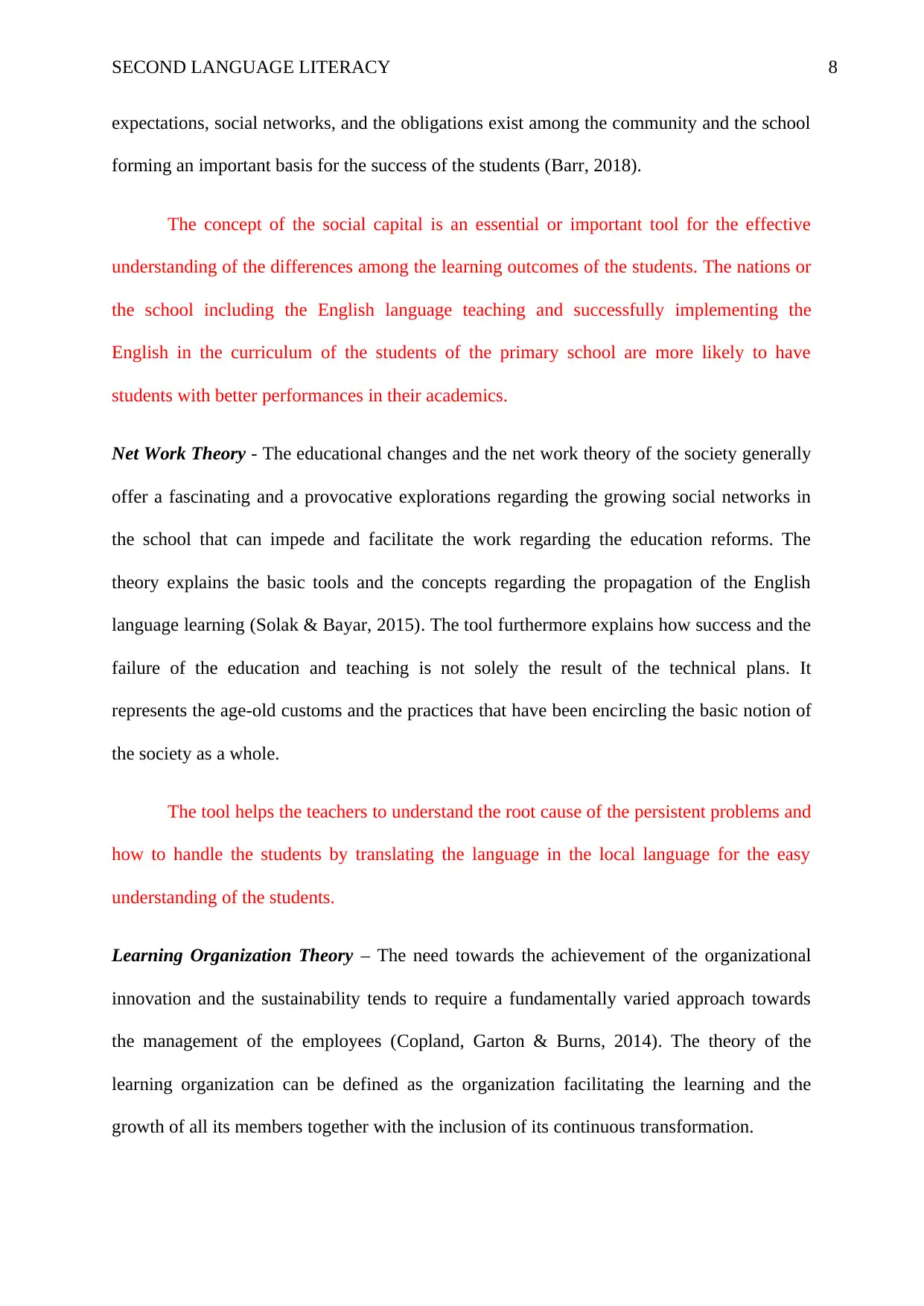
SECOND LANGUAGE LITERACY 8
expectations, social networks, and the obligations exist among the community and the school
forming an important basis for the success of the students (Barr, 2018).
The concept of the social capital is an essential or important tool for the effective
understanding of the differences among the learning outcomes of the students. The nations or
the school including the English language teaching and successfully implementing the
English in the curriculum of the students of the primary school are more likely to have
students with better performances in their academics.
Net Work Theory - The educational changes and the net work theory of the society generally
offer a fascinating and a provocative explorations regarding the growing social networks in
the school that can impede and facilitate the work regarding the education reforms. The
theory explains the basic tools and the concepts regarding the propagation of the English
language learning (Solak & Bayar, 2015). The tool furthermore explains how success and the
failure of the education and teaching is not solely the result of the technical plans. It
represents the age-old customs and the practices that have been encircling the basic notion of
the society as a whole.
The tool helps the teachers to understand the root cause of the persistent problems and
how to handle the students by translating the language in the local language for the easy
understanding of the students.
Learning Organization Theory – The need towards the achievement of the organizational
innovation and the sustainability tends to require a fundamentally varied approach towards
the management of the employees (Copland, Garton & Burns, 2014). The theory of the
learning organization can be defined as the organization facilitating the learning and the
growth of all its members together with the inclusion of its continuous transformation.
expectations, social networks, and the obligations exist among the community and the school
forming an important basis for the success of the students (Barr, 2018).
The concept of the social capital is an essential or important tool for the effective
understanding of the differences among the learning outcomes of the students. The nations or
the school including the English language teaching and successfully implementing the
English in the curriculum of the students of the primary school are more likely to have
students with better performances in their academics.
Net Work Theory - The educational changes and the net work theory of the society generally
offer a fascinating and a provocative explorations regarding the growing social networks in
the school that can impede and facilitate the work regarding the education reforms. The
theory explains the basic tools and the concepts regarding the propagation of the English
language learning (Solak & Bayar, 2015). The tool furthermore explains how success and the
failure of the education and teaching is not solely the result of the technical plans. It
represents the age-old customs and the practices that have been encircling the basic notion of
the society as a whole.
The tool helps the teachers to understand the root cause of the persistent problems and
how to handle the students by translating the language in the local language for the easy
understanding of the students.
Learning Organization Theory – The need towards the achievement of the organizational
innovation and the sustainability tends to require a fundamentally varied approach towards
the management of the employees (Copland, Garton & Burns, 2014). The theory of the
learning organization can be defined as the organization facilitating the learning and the
growth of all its members together with the inclusion of its continuous transformation.
⊘ This is a preview!⊘
Do you want full access?
Subscribe today to unlock all pages.

Trusted by 1+ million students worldwide
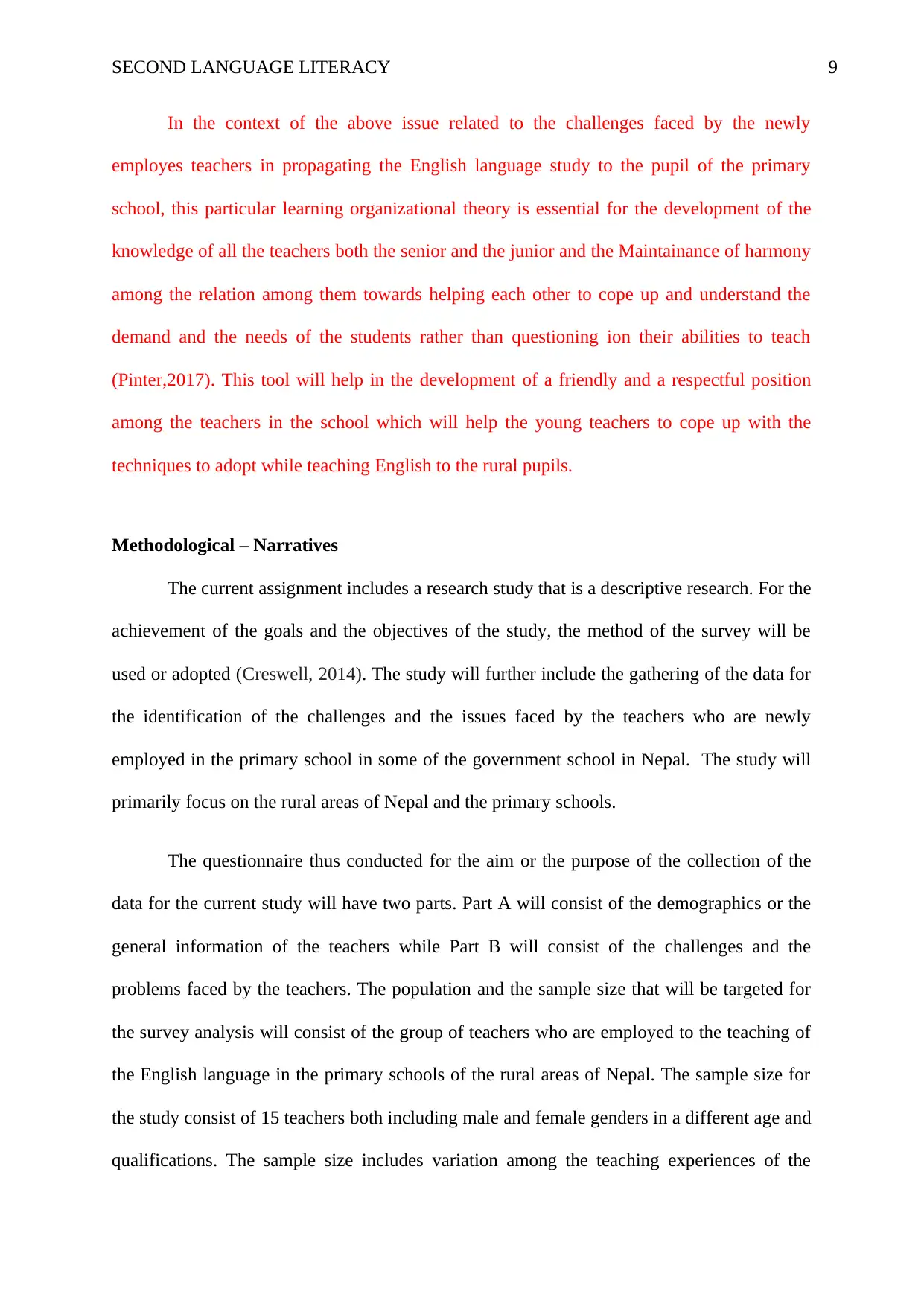
SECOND LANGUAGE LITERACY 9
In the context of the above issue related to the challenges faced by the newly
employes teachers in propagating the English language study to the pupil of the primary
school, this particular learning organizational theory is essential for the development of the
knowledge of all the teachers both the senior and the junior and the Maintainance of harmony
among the relation among them towards helping each other to cope up and understand the
demand and the needs of the students rather than questioning ion their abilities to teach
(Pinter,2017). This tool will help in the development of a friendly and a respectful position
among the teachers in the school which will help the young teachers to cope up with the
techniques to adopt while teaching English to the rural pupils.
Methodological – Narratives
The current assignment includes a research study that is a descriptive research. For the
achievement of the goals and the objectives of the study, the method of the survey will be
used or adopted (Creswell, 2014). The study will further include the gathering of the data for
the identification of the challenges and the issues faced by the teachers who are newly
employed in the primary school in some of the government school in Nepal. The study will
primarily focus on the rural areas of Nepal and the primary schools.
The questionnaire thus conducted for the aim or the purpose of the collection of the
data for the current study will have two parts. Part A will consist of the demographics or the
general information of the teachers while Part B will consist of the challenges and the
problems faced by the teachers. The population and the sample size that will be targeted for
the survey analysis will consist of the group of teachers who are employed to the teaching of
the English language in the primary schools of the rural areas of Nepal. The sample size for
the study consist of 15 teachers both including male and female genders in a different age and
qualifications. The sample size includes variation among the teaching experiences of the
In the context of the above issue related to the challenges faced by the newly
employes teachers in propagating the English language study to the pupil of the primary
school, this particular learning organizational theory is essential for the development of the
knowledge of all the teachers both the senior and the junior and the Maintainance of harmony
among the relation among them towards helping each other to cope up and understand the
demand and the needs of the students rather than questioning ion their abilities to teach
(Pinter,2017). This tool will help in the development of a friendly and a respectful position
among the teachers in the school which will help the young teachers to cope up with the
techniques to adopt while teaching English to the rural pupils.
Methodological – Narratives
The current assignment includes a research study that is a descriptive research. For the
achievement of the goals and the objectives of the study, the method of the survey will be
used or adopted (Creswell, 2014). The study will further include the gathering of the data for
the identification of the challenges and the issues faced by the teachers who are newly
employed in the primary school in some of the government school in Nepal. The study will
primarily focus on the rural areas of Nepal and the primary schools.
The questionnaire thus conducted for the aim or the purpose of the collection of the
data for the current study will have two parts. Part A will consist of the demographics or the
general information of the teachers while Part B will consist of the challenges and the
problems faced by the teachers. The population and the sample size that will be targeted for
the survey analysis will consist of the group of teachers who are employed to the teaching of
the English language in the primary schools of the rural areas of Nepal. The sample size for
the study consist of 15 teachers both including male and female genders in a different age and
qualifications. The sample size includes variation among the teaching experiences of the
Paraphrase This Document
Need a fresh take? Get an instant paraphrase of this document with our AI Paraphraser
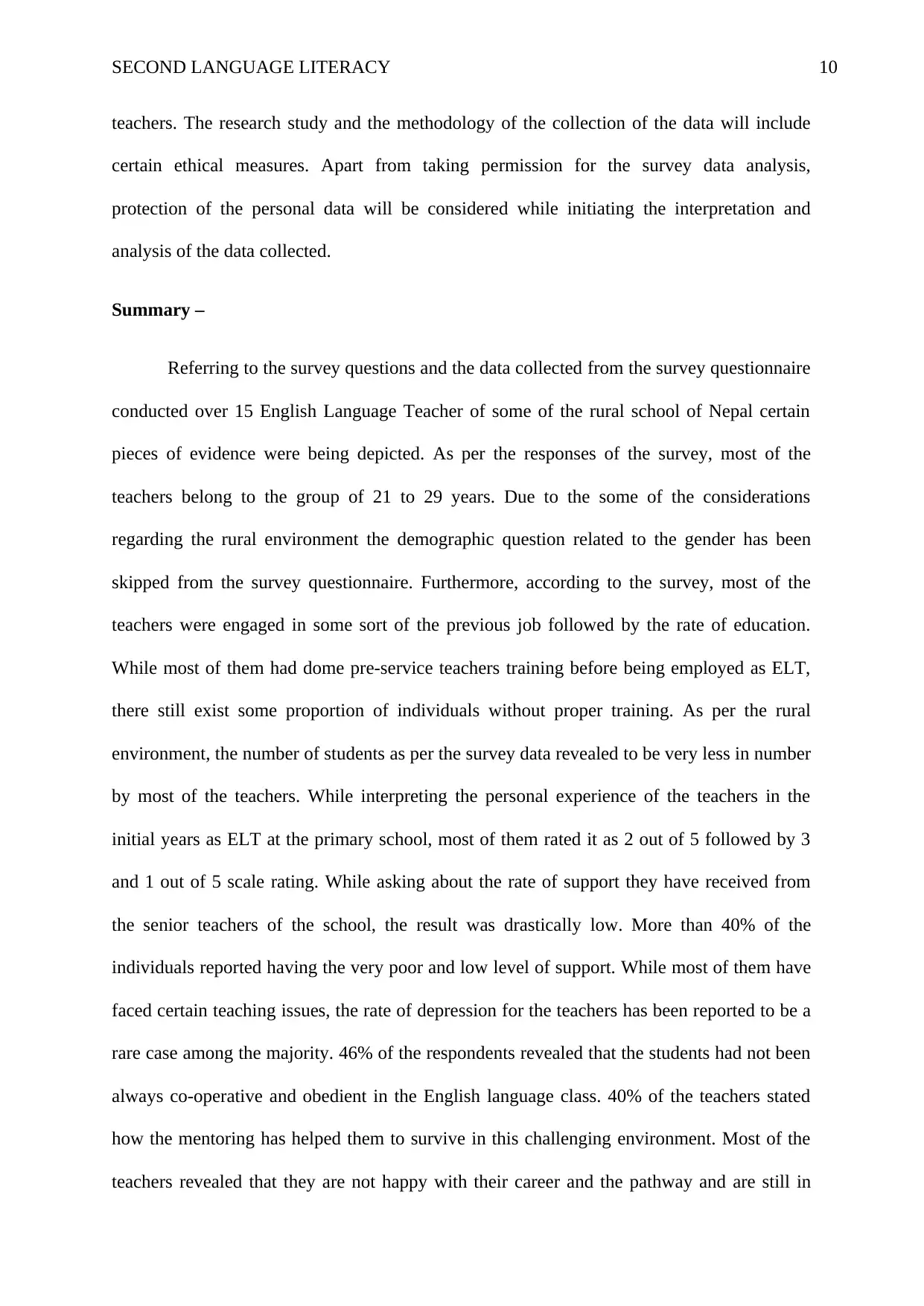
SECOND LANGUAGE LITERACY 10
teachers. The research study and the methodology of the collection of the data will include
certain ethical measures. Apart from taking permission for the survey data analysis,
protection of the personal data will be considered while initiating the interpretation and
analysis of the data collected.
Summary –
Referring to the survey questions and the data collected from the survey questionnaire
conducted over 15 English Language Teacher of some of the rural school of Nepal certain
pieces of evidence were being depicted. As per the responses of the survey, most of the
teachers belong to the group of 21 to 29 years. Due to the some of the considerations
regarding the rural environment the demographic question related to the gender has been
skipped from the survey questionnaire. Furthermore, according to the survey, most of the
teachers were engaged in some sort of the previous job followed by the rate of education.
While most of them had dome pre-service teachers training before being employed as ELT,
there still exist some proportion of individuals without proper training. As per the rural
environment, the number of students as per the survey data revealed to be very less in number
by most of the teachers. While interpreting the personal experience of the teachers in the
initial years as ELT at the primary school, most of them rated it as 2 out of 5 followed by 3
and 1 out of 5 scale rating. While asking about the rate of support they have received from
the senior teachers of the school, the result was drastically low. More than 40% of the
individuals reported having the very poor and low level of support. While most of them have
faced certain teaching issues, the rate of depression for the teachers has been reported to be a
rare case among the majority. 46% of the respondents revealed that the students had not been
always co-operative and obedient in the English language class. 40% of the teachers stated
how the mentoring has helped them to survive in this challenging environment. Most of the
teachers revealed that they are not happy with their career and the pathway and are still in
teachers. The research study and the methodology of the collection of the data will include
certain ethical measures. Apart from taking permission for the survey data analysis,
protection of the personal data will be considered while initiating the interpretation and
analysis of the data collected.
Summary –
Referring to the survey questions and the data collected from the survey questionnaire
conducted over 15 English Language Teacher of some of the rural school of Nepal certain
pieces of evidence were being depicted. As per the responses of the survey, most of the
teachers belong to the group of 21 to 29 years. Due to the some of the considerations
regarding the rural environment the demographic question related to the gender has been
skipped from the survey questionnaire. Furthermore, according to the survey, most of the
teachers were engaged in some sort of the previous job followed by the rate of education.
While most of them had dome pre-service teachers training before being employed as ELT,
there still exist some proportion of individuals without proper training. As per the rural
environment, the number of students as per the survey data revealed to be very less in number
by most of the teachers. While interpreting the personal experience of the teachers in the
initial years as ELT at the primary school, most of them rated it as 2 out of 5 followed by 3
and 1 out of 5 scale rating. While asking about the rate of support they have received from
the senior teachers of the school, the result was drastically low. More than 40% of the
individuals reported having the very poor and low level of support. While most of them have
faced certain teaching issues, the rate of depression for the teachers has been reported to be a
rare case among the majority. 46% of the respondents revealed that the students had not been
always co-operative and obedient in the English language class. 40% of the teachers stated
how the mentoring has helped them to survive in this challenging environment. Most of the
teachers revealed that they are not happy with their career and the pathway and are still in

SECOND LANGUAGE LITERACY 11
dilemma whether to continue this profession of being ELT in the upcoming years. The survey
furthermore revealed how the teachers are being forced to use the method of translation as
per the student's demand for the understanding of the English text.
dilemma whether to continue this profession of being ELT in the upcoming years. The survey
furthermore revealed how the teachers are being forced to use the method of translation as
per the student's demand for the understanding of the English text.
⊘ This is a preview!⊘
Do you want full access?
Subscribe today to unlock all pages.

Trusted by 1+ million students worldwide
1 out of 25
Related Documents
Your All-in-One AI-Powered Toolkit for Academic Success.
+13062052269
info@desklib.com
Available 24*7 on WhatsApp / Email
![[object Object]](/_next/static/media/star-bottom.7253800d.svg)
Unlock your academic potential
Copyright © 2020–2026 A2Z Services. All Rights Reserved. Developed and managed by ZUCOL.





